April 6, 2022 Minutes
Faculty Senate Meeting Minutes (Leon Johnson 346)
04.06.2022
3:15pm – 4:30pm
WebEx for those not able to attend in person:
|
Name |
Represents |
Attended |
|
Watson, Bradford |
Chair |
x |
|
Brody, Michael |
Chair-Elect |
x |
|
Amendola, Roberta |
EN/Mechanical & Industrial Engineering |
x |
|
Anderson, Ryan |
EN/Chemical Engineering |
x |
|
Brookshire, Jack |
AG/Land Resources |
x |
|
Carson, Robert |
EHHD/Education |
x |
|
Caton, Gary-Webex |
Business |
x |
|
Coffey, Jerry-Webex |
Emeritus Faculty |
x |
|
Cowan, Susanne |
AR/Architecture |
x |
|
Dale, Catherine-Webex |
AR/Film & Photo |
x |
|
Dratz, Ed |
LS/Chemistry & Biochemistry |
x |
|
Ellis, Colter |
LS/Sociology & Anthropology |
x |
|
Flory, Dan |
LS/History & Philosophy |
x |
|
Gao, Hongwei-Webex |
EN/Electrical & Computer Engineering |
x |
|
Gedeon, Tomas |
LS/Mathematics |
x |
|
Hansen, Andy-Webex |
LS/Ecology |
x |
|
Haynes, George-Webex |
Extension/On campus |
x |
|
Hill, Andrew |
AG/Agricultural Economics |
x |
|
Izurieta, Clemente |
EN/Computer Science |
x |
|
Jeon, Minjee |
AR/Art |
x |
|
Lachapelle, Paul-Webex |
LS/Political Science |
x |
|
McWethy, David |
LS/Earth Sciences |
x |
|
Miller, Zach-Webex |
AG/Research Centers |
x |
|
Rebane, Aleks |
LS/Physics |
x |
|
Rognlie, Juli |
Gallatin College |
x |
|
Stein, Otto |
EN/Civil Engineering |
x |
|
Stoneback, Sarah |
AR/Music |
x |
|
Thomas, Amy-Webex |
LS/English |
x |
|
Tillack, Peter |
LS/Modern Languages |
x |
|
Van Emon, Megan-Webex |
AG/Animal & Range |
x |
|
Walach, Michael |
AG/Agriculture Education |
x |
|
Young, Scott-Webex |
Library |
x |
|
Alternates |
Represents |
Attended |
|
Hatch, Jeremy |
AR/Art |
x |
|
Johnson, Elizabeth-Webex (Alternate to alternate) |
Nursing/On Campus |
x |
|
Stowers, Steve-Webex |
AG/Microbiology & Cell Biology |
x |
|
OTHER ATTENDEES |
Represents |
Attended |
|
Adams, Dean-Webex |
Center for Faculty Excellence |
x |
|
Babcock, Michael |
Earth Sciences |
x |
|
Bolte, Jason-Webex |
School of Music |
x |
|
DeWeese, Josh |
School of Art |
x |
|
Donohue, Ariel-Webex |
Diversity & Inclusion |
x |
|
Elliot, Duke |
Engineering & Utilities University Services |
x |
|
Fastnow, Chris |
Planning and Analysis |
x |
|
Lee, Ilse-Mari |
Honors |
x |
|
Palin, JoDee |
Arts and Architecture |
x |
|
Provost Mokwa |
Provost |
x |
|
Sobek, Durward-Webex |
Provost Office |
x |
|
Sterl, Megan |
Engineering & Utilities University Services |
x |
|
Students in Support of HONR 309 |
Molly-Engineering Tristan-Engineering Carina-History |
x x x |
|
Swensen, Isaac-Webex |
Agricultural Economics & Economics |
x |
|
Swinford, Steve |
Provost Office |
x |
|
Weber, Liz |
Bozeman Daily Chronicle |
x |
|
Zimpel, Jim |
Arts and Architecture |
x |
I. Call to Order
a. Meeting was called to order at 3:15pm
II. Approval of FS Minutes from March 23, 2022
a. Tomas Gedeon moves to approve. Andrew Hill seconds. None opposed. Approved.
III. FYI items
a. MSU writing center seeks faculty help in recruiting tutors
i. https://www.montana.edu/calendar/events/41702
ii. Deadline is April 20
b. MyInfo Rolling Upgrades
i. https://www.montana.edu/uit/pmo/currentprojects/myinfoupgrade/
c. Outreach & Engagement See Grant Program, due April 11, 2022
i. Up to $5,000 available
ii. https://www.montana.edu/calendar/events/40821
d. Updated MSU Policy and Procedures website
i. https://www.montana.edu/policy/
e. Senator Hour, Monday 11:30-12:30 and Thursday 10:30-11:30 via WebEx
IV. Information Updates:
a. Chair Elect at next Senate meeting
i. This will be an Executive Session
ii. 3 years: one as Chair Elect, 1 as Chair and one more as Past Chair
iii. Any tenured faculty member on campus is eligible
b. Gender Equity Alliance
i. https://www.montana.edu/diversity/data/genderequity/index.html
c. MUS Learning Management System
i. https://www.mus.edu/che/arsa/LMS/SingleLMS.html
ii. Email from Provost came out this morning with a survey to gather info on what our RFP will look like.
A. Surveying across campus
iii. Have been in touch with eight different providers.
iv. RFP will be developed over the summer.
v. Eventual transition would be done over 2.5 years
vi. Doesn’t necessarily mean we will change?
A. OCHE is wanting to move every campus to the SAME LMS.
B. Trying to figure out what we would be looking for in a new LMS.
d. UAS Policy
i. If you use this type of technology, please look at the info and send any concerns to Bradford, Michael or Camie Bechtold
e. Sustainability Summit
i. montana.edu/sustainability/summit/summit.html
A. Keynote Lecture Monday April 18 at 5pm
B. Morning Tours April 19, 9-11:30
C. Reports from Campus April 19, 1-5
ii. Will be listening sessions for those interested
f. Scope 1 Greenhouse Gas Emissions – Office of Sustainability-Megan Sterl and Duke Elliot of Engineering & Utilities University Services
i. University Services
A. Campus Planning Design & Construction
B. Engineering & Utilities
1. Utility Infrastructure & Procurement
2. Engineered Systems
3. Resource Conservation
C. Faculties Services
D. Safety and Risk Management
E. Budget & Accounting
ii. Scope I Definition
A. direct greenhouse (GHG) emissions that occur from sources controlled or owned by an organization (e.g., emissions associated with fuel combustion in boilers, furnaces, vehicles)
B. 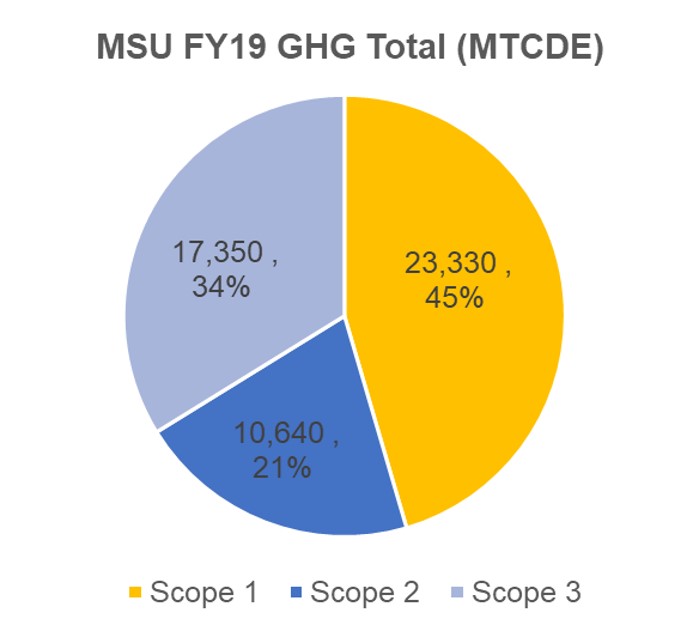
iii. Scope I Breakdown
A. 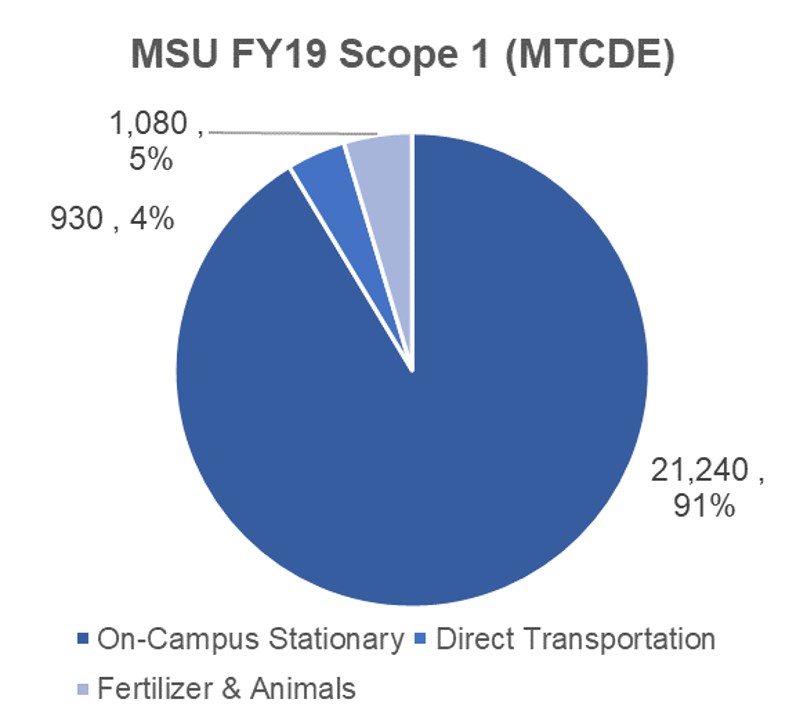
1. Majority is burning of fuel
2. Other 9% is direct transportation-different from scope three
a. Anything located here on campus
3. 5% is Fertilizer and Animals
B. Haven’t had to add to the heat plant even though we are adding square footage
C. Stadium sized pile of wood, 30 ft high, is the equivalent of what we go through in energy on campus
iv. Scope I Transition
A. How do we switch from carbon-based fuel to a cleaner fuel?
1. Switch to electricity
2. Have to do it in a wise way
v. MSU Success Stories
A. For 10+ years MSU has demonstrated a path to transition Scope 1 emissions
B. Leon Johnson Energy District
1. Concept developed 2009; central heat pump plant installed (2010)
a. Transition to electricity
b. Electrified the system
c. Reduced energy
d. Can use green energy in the future
2. Leon Johnson Hall, Jabs Hall, Wilson Hall, Tietz Hall
3. 52 geothermal bores, 500 ft deep
4. 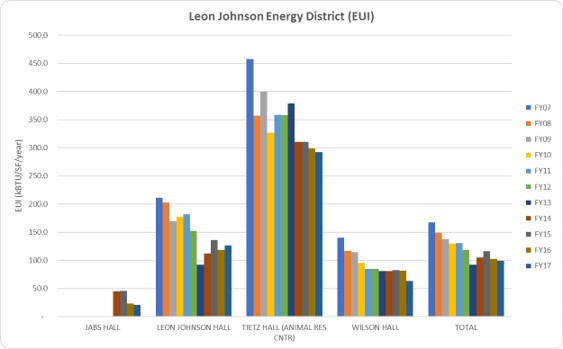
C. South Campus Energy District
1. 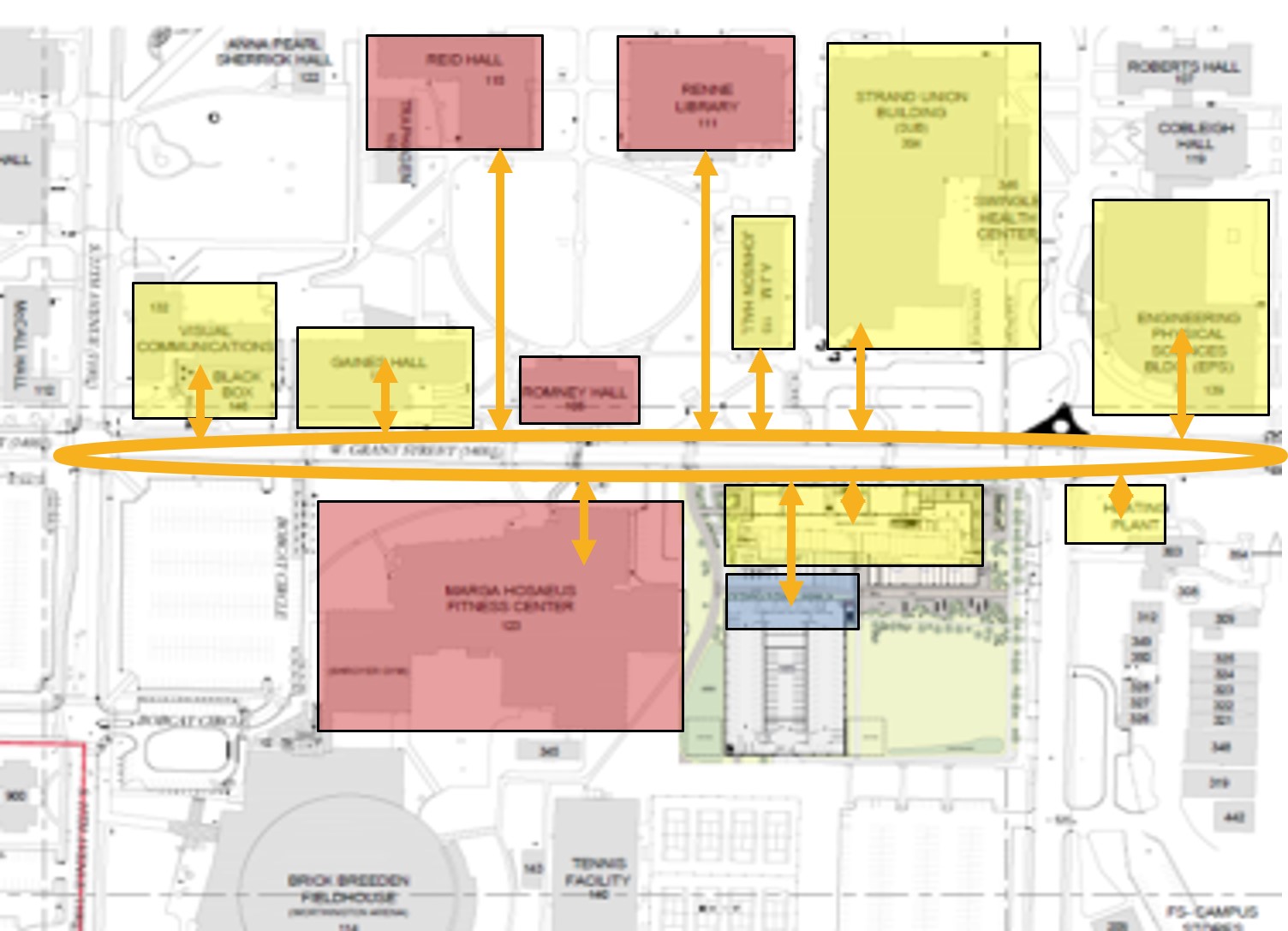
2. 80 Geothermal wells in Romney oval
3. Capture excess energy and move it around and use it.
D. Student and Faculty Involvement
1. Hands-on living lab
2. 2017-2019 Campus District Modeling Approach
3. 2019-2021 South Campus District Heat Source and Sink Assessment
4. 2016 Jabs Hall Transpired Solar Collector
a. Preheats the air we bring into the building
b. Every new building will have this system
5. University Services is committed to providing living laboratories for MSU students to gain hands-on learning opportunities and real-world skills. The Engineering & Utilities department provides access to campus facilities, infrastructure and building professionals, merging academics with the management of campus engineered systems.
vi. Scope I Next Steps
A. MSU Engineering staff
B. Review building systems
1. Each building will have different issues
C. Determine options to transition Scope 1
D. Estimate construction costs and timeframe ($150M ++ project)
1. It is going to take a long time to transition
E. Estimate increase in Scope 2 and utility cost
vii. Questions
A. Where does the energy come from?
1. Majority is from Northwestern Energy
2. WAPA- Hydro Power 40%
3. 5% generated on campus
B. Appreciate the progress you have made.
C. Emissions at 50,000 metric tons equivalent
1. All scopes have flatted out at 50,000
a. Climate doesn’t care if our campus is growing. It needs our emissions to be lower.
2. When will we see the plan for the “immediate and rapid” implementation?
a. Engineering staff on campus is looking at what the trends are in usage on campus.
I. Hope that by summer we will have the information to work with the administration on how to fund them.
viii. Follow Up on Sustainability Summit
A. Please attend the summit
B. Will be setting up an “author’s table” for those faculty who have written a published document.
1. Send your info to Paul Edlund
ix. Megan Sterl, PE
A. Director of Engineering & Utilities
University Services
Office 406-994-6544
x. Duke Elliott
A. Resource Conservation Specialist
Engineering and Utilities
Office 406-994-6632
g. Bystander Intervention and Field Safety – Expanding our definitions-Madison Myers and Meredith Knowles
i. Bystander Intervention and Field Safety – Expanding our definitions
ii. Unlearning Racism in Geoscience (URGE)
A. Participants from multiple departments in the college of letters and sciences
B. Included 12 participants of faculty and staff (CLS)
C. Involved reading, reflecting, and creating action items
1. In order to be better about supporting our students going forward
iii. Improving workplace climate: empowering individuals to become active bystanders
A. Participants from Earth Sciences, Ecology, and LRES
B. Included faculty, staff, and students
C. 44 participants from Montana State
D. The 5 Ds of Bystander Intervention
1. Advancegeo Partnership, serc.carelton.edu
2. Direct – confront the situation
3. Distract- take an indirect approach to de-escalate the situation. Deflect attention away.
4. Delegate – seek help from a third party
5. Delay- Check in with the person being affected. Follow up. Offer support.
6. Document- Create a record to build a pattern of behavior – don't share w/o victims' permission!
E. Harassment does not have to be illegal to have damaging consequences
1. 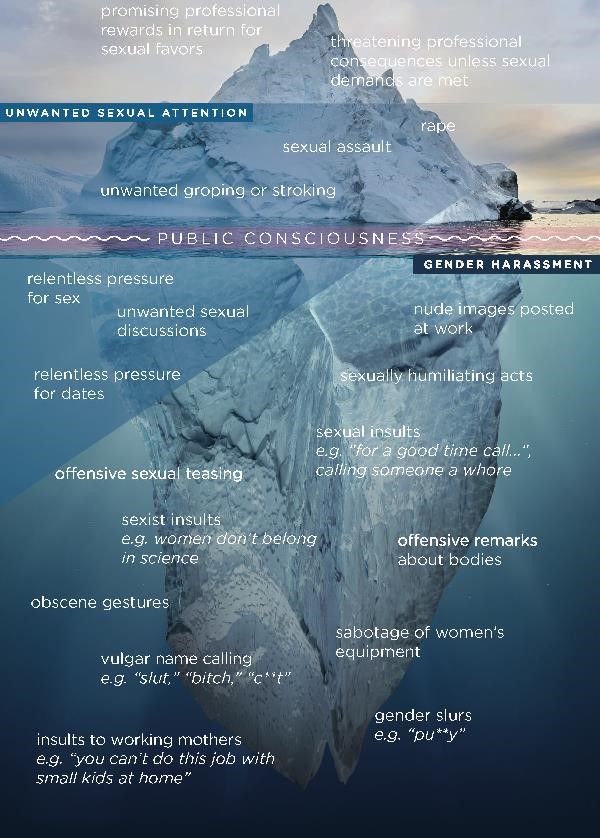
F. Report of the Workshop to Promote Safety in Field Sciences March 24-26, 2021
1. oceanleadership.org
2. Work shopping our own guide:
a. Statement of Shared Values
b. Adapted "Seeds of Safety": Things to keep in mind while have discussions
c. Bystander Intervention – Tools to support someone who is being harm
d. Physical Safety and Pre-Trip Trainings (Wilderness First Aid)
e. Returning from the Field- reporting, resources and how do we give and receive feedback
h. Faculty Hiring, Salary, Market, Merit and Equity, Provost Mokwa
i. TT Faculty are on MUS contracts, which must adhere to guidelines and rules from OCHE and the BOR. MSU works closely with the Commissioner’s Office on salary matters and we appreciate the support they have shown over the past year in helping us improve faculty and staff salaries. Bradford and Michael requested that I provide an update today on faculty raises. My remarks today are focused on faculty salaries; although be aware that considerable efforts by MSU are ongoing to address staff salaries. This could be a topic for another time.
ii. There are three mechanisms available for TT Faculty salary adjustments.
A. State employee increases that are approved during a legislative session.
1. These raises are part of the pay plan request submitted to the Governor’s budget office --prior to a legislative session-- by OCHE for all employees in the MUS.
2. MSU awards the entire raise as approved, however we only receive funding for about 40% of the approved increase for our employees.
3. During the 2021 state legislative session, a pay increase for state employees was approved, effective the 2nd year of the biennium. These pay increases will be effective November 5, 2022.
4. The 2021 approval was for the greater of 2% of existing base salary or 0.55 per hour (pro-rated by FTE).
B. Annual Market, Merit and Equity adjustments (MME)
1. *MME raises are independent and on top of any pay plan increases*
2. The Office of Academic Affairs works with HR, OPA and Budget Office in assembling salary and benchmark data. Deans are asked to check awards for their college before letters acknowledging a raise are sent to faculty.
3. Equity and Merit adjustments are effective Jan. 1.
a. Adjustments are calculated based on Dec. 31 base salary.
b. DHs and Directors provide recommendations to their dean.
c. Deans each prioritize recommendations for their college.
d. Timeline:
I. mid Nov.: Prioritized recommendations from Deans are due in the Office of the Provost.
II. late Dec.: Faculty selected for adjustments are notified by letter from Office of the Provost.
III. early Jan. 1: Adjustments are effective and will appear on the appropriate bi-weekly payroll.
4. Equity:
a. Flat rate (dollar amount) increase to annual salary based on DHs and Deans recommendations to address issues of internal pay equity, typically at the department level.
b. Equity adjustments are typically in the range of $1,500-$2,000.
c. This year ,the total pool size for equity was $99,000.
d. Equity Priorities:
I. Significant salary compression within a department, taking into account discipline area and rank.
II. Salary inversion within a department, taking into account discipline area and rank.
III. Significant inequity within a department perceived to be based upon gender or other protected status.
IV. Other
5. Merit:
a. DHs and Directors provide recommendations to their dean.
b. Deans prioritize recommendations for the college.
c. Merit adjustment recommendations for TT faculty require a Strong Performance or above rating for three years.
d. Merit adjustments are typically 1.5% - 3.5% of base.
e. This year ,the total pool size for merit was $1.07M. (This is three times the next largest merit pool that we have ever had at MSU.)
6. Market
a. Adjustments effective Jan. 1 (congruent with merit and equity raises).
b. Based on Dec. 31 base salary.
c. Raise amount = $1,000-$2,500. Market evaluations are based on percent of Oklahoma State University benchmark data for comparable TT faculty, disaggregated by discipline and rank (OSU benchmark values by discipline, CIP code and rank). Data supplied by OPA.
d. CUPA benchmarks are used for professionals (non-faculty).
e. This year ,the total pool size for market was $76,000.
C. Promotion raises based on Retention Tenure Promotion Faculty Handbook process
1. For the current cycle (AY 21-22) and for future RTP cycles.
a. Tenure promotions from Assistant to Associate will be 10% of contract base (previously 6.5%). New title is effective upon BOR approval at the May Board meeting.
b. Pay increase is effective at start of contract. (for FY faculty = July 1, 2022; for AY faculty = Aug. 18, 2022)
c. Promotion from Assoc. to Full will be 20% of contract base (previously 10%). The same title and salary adjustment timeline as associate promotion.
d. The raises are for the promotion in rank, not the tenure component.
e. The total pool size for the 2022 promotion allocations will be $199,000.
D. Promotion adjustments for previous promotions that were awarded over the last 3 years:
1. 3-year salary adjustments will be made for faculty who were promoted in AY 18-19, AY 19-20, and AY 20-21.
2. If tenured and promoted to associate during the last 3 years, the faculty will receive a 3.5% increase to their current contract base (6.5% + 3.5% = 10%), effective Jan. 1, 2023 (i.e., the same time as the MME raises are awarded).
3. If promoted to full during the last 3 years, the faculty will receive a 10% increase to their current contract base (10% + 10% = 20%), effective Jan. 1, 2023.
4. Several faculty who will be promoted to full in AY21-22 will also fall in the previous 3-yr cycle for associate promotion. Their salaries and timing of promotions will be reviewed and adjusted accordingly.
5. The total pool size for this backfilling process in 2023 will be $595,000.
E. Non-Tenure Track one-time awards:
1. These OTO awards are made in accordance with the NTT CBA.
2. MSU distributes from a pool of $50,000 to selected NTT faculty for Merit awards each spring.
3. The awards consist of one-time-only distributions of $2,000 per selected NTT.
4. The awards are based on a prioritized list provided by each Dean, who receive input from DHs and Directors in their college.
5. The awards are non-recurring, i.e., base budgets and salaries are not impacted.
6. The awards are provided in the last pay roll of their contract.
F. Additional general comments from Provost Mokwa:
1. The total pool of funds for MME and promotion raises fluctuate depending on many factors; however, it is encouraging to report that the pool size has increased steadily and is now 128% larger (about $800,000) than it was in 2014.
2. Faculty have other opportunities for one-time salary enhancements, including teaching summer school classes and the Incentive Program for Researchers (IPR).
3. Where possible, starting salary ranges for ongoing faculty searches have been increased for this year’s hiring cycle.
4. The university is examining NTT salaries and has initiated base raises in some of the lowest paid areas. This is a phased approach that will expand depending on the availability of additional base resources.
5. Considerable efforts are underway to address staff salaries. This is a separate conversation from our discussion today, which is best addressed by MSU Human Resources personnel who are working closely with our system office.
G. Questions
1. How do the NTT raises work?
a. Rely on the departments and colleges to make those decisions.
I. Does each college get the same amount?
a. Percentage of funds is based on a college’s list of NTTs
b. NTT hiring salaries are being increased as well
c. Hitting groups across campus in phases as budgets allow
2. What about staff?
a. Staff or in another office
3. Discussions with legislature?
a. What we shared with OCHE (data and numbers) will be shared with the legislature as they see fit. OCHE does the lobbying.
iii. Ongoing work from across campus to work with our Commissioner and Regents on some of the struggle we are facing
iv. MUS operates as a system. That creates some issues.
V. Undergraduate Courses and Programs
a. Courses – First Reading
i. ELCT 111 : Electric Meters and Motors (Fall 2022)
ii. HONR 309 : Unleashing Scientific Innovation through Visual Communication (Fall 2022)
A. Faculty Senate Chair Elect sits on the Curriculum and Programs Committee
1. Each college has representation on CPC
2. Have been moving toward the Honors college getting approval for hard numbered courses (instead of going through as a Special Topics course which gets only dept and college review.)
3. Has been discussed at every meeting since the beginning of February.
a. Title and outcomes have been updated.
4. Voted on and approved by CPC
5. This will come back for a second reading at our next meeting
B. Questions/Comments
1. Alternate Jeremy Hatch
a. Main objection is that it replicates a course we already have on campus
I. ARTZ 109RA and ARTZ 110RA
b. Even at the 100 level, these courses have much more rigor than the proposed 300 level Honor’s course.
2. Senator Sarah Stoneback
a. Concern that it is duplicative
b. Larger question from Music: How does the Honors interface with the other departments across campus
I. HONR rubric courses
II. Other rubrics that have Honors in the title
a. Do we need to create a policy on how these two versions of honors courses work?
3. Clem Izurieta
a. Substantial difference between 100 and 300 level courses
b. Students are supposed to be STEM students
I. This could be very helpful for STEM students
iii. LIT 343 : African American Literature (Fall 2022)
iv. PLTT 100 : Introduction to Photonics and Advanced Manufacturing (Fall 2022)
b. Courses Changes– First Reading
i. GDSN 223 : Typography Principles
A. Update to course name to reflect accurate course themes and projects centered around typography education. This name change also helps designate thematic approaches that are different than GDSN 224; Form and Content taught in the spring semester.
ii. PHSX 301 : Mathematical Methods in the Physical Sciences
A. Title change has been agreed upon by MSU and UM collectively. Has been approved by CCN and OCHE.
B. Changing title from, Introduction to Theoretical Physics
C. Changing name to emphasize its application (and appeal) to students in the physical sciences outside of physics majors.
c. Courses – Second Reading
i. AHMS 210 : Basic Medical Coding (Fall 2022)
ii. CSTN 100 : Fundamentals of Construction Technology (Fall 2022)
iii. CSTN 105 : Introduction to Woodworking (Fall 2022)
iv. CSTN 120 : Carpentry Basics and Rough-In Framing (Fall 2022)
v. CSTN 122 : Beginning Carpentry Lab (Fall 2022)
d. Courses Changes– Second Reading
i. NRSG 469 : Culturally Responsive Care in Nursing: The (Specific Culture) Experience
A. Title changed from: NRSG 469 :Cultural Applications Apps in Nursing: The (Specific Culture) Experience
e. Courses Inactivations – First Reading
i. PSCI 201 : Scope and Methods of Political Science
A. The Political Science major no longer requires PSCI 201 Scope and Methods. This change has been approved and updated in the program of study for this degree for the 2022-2023 academic year.
ii. STAT 201Q : Statistics in the World
A. Course has not been offered since Spring 2012
iii. STAT 226Q : Honors Introduction to Statistics
A. Course has not been offered since 2009
f. Programs
i. None at this time
g. Program Inactivation
i. None at this time
VI. Graduate Courses and Programs
a. None at this time
VII. Old Business
a. Sabbatical Evaluation Scoring
i. Sarah Stoneback
i. How well does the project contribute to the faculty member’s integration of teaching and scholarship activity? (5 points)
1. - I am not sure why the integration of teaching and scholarship is required. It makes it very difficult if the scholarship is outside of our assigned teaching. Especially in undergraduate only programs. Why signal out Teaching and research? RTP: integration can also be between service and research or service and teaching. Number of letters that are required from outside is hard. Hard to find that many people available.
ii. In addition to the criteria listed above, applicants also receive credit based on the following:
1. - I am a bit concerned that we are placing a larger emphasis on rank rather than time of service. There are many reasons why a faculty member may not want to submit for full professor. Also Associate professors looking toward promotion will benefit from a sabbatical as they submit their promotion dossier.
iii. Letters… this is an increase in the number of letters - 4 letters (Currently 3 w/ one outside)
1. - Just be aware that it can be difficult to find outside letter writers who have time.
2. - really like the guidance for the letters.
b. Thought re-write was much cleaner.
c. Tomas Gedeon moves to endorse with additional comments today. Clem Izurieta seconds. Approved. None opposed. No abstention.
VIII. New Business
a. Sabbatical Policy
i. See attached for proposed revisions
ii. Anything in bold is from the BOR
iii. When originally written, the thought was that anyone here for 7 years would have been tenured. Now it reads 7 years AND tenure.
iv. Existing Sabbatical Leave
A. https://www.montana.edu/policy/faculty_handbook/sabbatical_leave.html
b. Faculty Responsibilities
i. See attached for proposed revisions
ii. Review handbook every three years
iii. Student code of conduct is being revised.
A. Some faculty responsibilities are being removed from student COD and moved to Faculty Handbook
iv. Faculty office hours
A. Mixture of modalities of office hours is very helpful. Works much better than face to face only meetings.
B. Read it is a prohibition on virtual office hours
1. Got used to doing virtual meetings during COVID
2. Students really like them too
3. Would hate to see them go
C. Paul Lachapelle
1. I do think several of the changes are pretty ham-handed responses that universally take away faculty discretion to fix problems that I don’t think are wide-spread. I’d hope those can be walked back a bit. In the past, most of these kinds of policy changes were either drafted and considered in detail in Senate – which I think should happen with this policy – or were handled in JAGS. If they are being handled in JAGS instead, I’d hope that there are some clear recommendations for revisions from FS or from Faculty Steering, particularly for office hours and class absences/cancelations, that are taken to JAGS for consideration.
D. Do you have data behind issues with office hours?
1. Provost Mokwa:
a. This is meant to help. The wording may not be right yet, but it is meant to help.
b. No way intended to keep you from virtual meetings with students
c. Would like to see some guidelines
d. Have found that students have disengaged
I. Don’t want students walking down a hallway of closed office doors.
II. Some faculty have disengaged as well
III. Male students are really struggling
2. Not seeing any issues
v. Existing Responsibilities
A. https://www.montana.edu/policy/faculty_handbook/faculty_responsibilities.html
IX. Senators’ Open Conversation
a. None
X. Public Comment
a. Carina Kitchen, History student
i. Honors course 309
A. Favorite class taken at MSU.
B. Understand the concerns.
1. Not art students, so work may not be what an art student’s would be
2. Important for non-art students to have this experience
b. Tristan-Engineering
i. Honors course
A. Favorite class taken
1. Other classmates agree
B. Excited to be a college student
C. Not about learning how to make a brush stroke, it’s about how to express yourself in an artistic way
c. JoDee Palin, Associate Dean
i. Why can’t you take one of the art classes out of CAA?
ii. We always bring who we are into the classroom
iii. Feel the beginning art program is being disrespected
A. Art is what we do, we are the experts
B. Art matters, it’s importance
C. Artists work for years to get to be experts in what they do
d. Molly Taylor, Engineering
i. Do not mean any disrespect to Arts and Architecture
ii. In all of my other classes there is only ONE answer to every questions
A. Need to have the experience where there is more than one answer to each question
B. Breaking out of that pattern of “one answer” thinking.
e. Jim Zimpel
i. Three students are telling us this is a valuable tool and skill set.
A. Why not take this as a core course that is already developed?
B. Want you to have these skills, ability to articulate your ideas.
f. Isle-Mari Lee, Honors
i. This is an upper-level interdisciplinary seminar course
A. This is for these students to synthesize what they’ve learned in their field.
g. Josh DeWeese, Art
i. Would like you to develop the tools BEFORE you synthesize what you’ve learned in an expressive way.
ii. Offered right at the end, to get it done.
A. You need those skills
h. Jeff Heys, Honors
i. Only 5% of MSU students can take this
ii. They need this course.
A. Art feels they already have it
XI. Adjourn
a. Ryan Anderson moves to approve. Peter Tillack seconds. Meeting was adjourned at 4:55pm.
